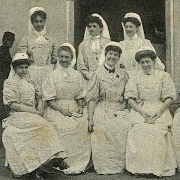Inès de Bourgoing
The Baron was the Grand Squire of France to Napoleon III; he then served as Inspector of the Haras Equestrian Service before being elected five times as the Député for Nièvre in the French Parliament.
[1] Fortoul was often called to serve abroad in Japan and south-east Asia; between 1882 and 1885, he was in Tonkin in Indochina, returning home after being seriously injured.
[2][1] During his absence, in addition to raising her two boys, de Bourgoing wrote nearly 1,000 pages of letters to her husband, now preserved in her archive.
[1] As both her sons, now grown, had embarked on military careers,[3] de Bourgoing determined to study nursing, hoping she could help to alleviate sickness and distress in France's colonies.
As conditions were difficult in Morocco, it was decided the wounded and seriously ill should be transported to Oran in Algeria where it would be easier to provide proper treatment.
It was in October 1907 while she and two of her nurses were accompanying the wounded on a French naval crossing to Oran, that she first met General Hubert Lyautey, who was division commander there.
[1][6] After spending fifteen months in North Africa, she returned to France, only to leave shortly afterwards for the Italian port Messina in December where she and her nursing team helped care for the 80,000 victims of the 1908 earthquake.
[9] De Bourgoing was instrumental in the creation and organisation of many programmes for women and children including nurseries, kindergartens, and the first maternity center in Morocco, an exemplary institution which impressed child care specialists in France and abroad.
[15] During World War I, in France, she served as a supervisor at the Military Hospital Val-de-Grâce and in 1918, she organised and supervised programs for the SSBM in Nancy.
Unable to leave France because of World War II, she initiated programs to provide care packages for troops and POWs in North Africa.
[19] In 1944, despite the cold winter, she travelled to the front lines in the Vosges to encourage the 2nd Moroccan Infantry Division who were engaged in heavy battles with the Germans.
Addressing her as La Maréchale Lyautey, he emphasized how her work as a nurse in Morocco had contributed so much to France's humanitarian image, thanks to the way in which she had striven to create a bond between the two countries.
Through her works to care for wounded soldiers, help the weak and the poor regardless of race, gender or faith, she won acclaim from those who had turned out in sympathy in both Casablanca and Rabat over the two days of her memorials.
France's appreciation had been expressed in her recent decoration as a Grand Officier de la Légion d'Honneur, the very first time the title had been conferred on a woman.



